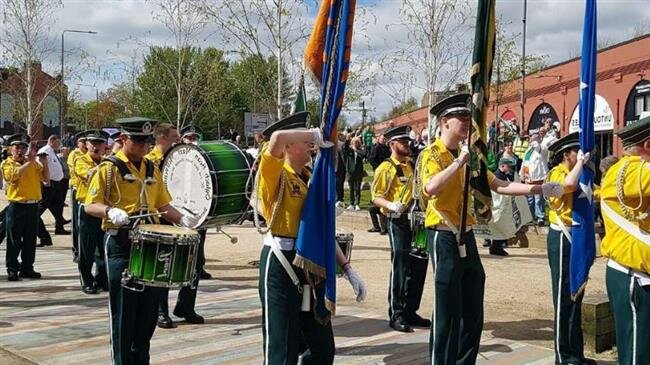Supporters of Irish Unity are mobilising in Scotland
The Scottish city of Glasgow is awash with anticipation today as two Irish Unity marches are set to take place later in the afternoon.
The events are expected to attract violent loyalist counter-demonstrators who may try to disrupt the peaceful Irish Unity rallies.
Police Scotland has said it will have a “significant” presence at both marches and that security for the events had been “extensively planned”.
A week ago, an Irish Unity march, organized by the James Connolly Republican Flute Band (named after a leader of the Easter Rising of 1916 who was executed by the British), was attacked by loyalist gangs.
Today’s marches are organized by two distinct Scotland-based Irish Republican groups.
The first march, led by the Cairde na hEireann (Friends of Ireland) group is set to march from Millroad Street (in the east end of Glasgow) beginning at 14:00 BST.
The second march, organized by the Friends of the Irish Republican Prisoners Welfare Association (IRPWA), is set to commence at 15:00 BST from Blythswood Square (near the city centre) and finish at Barrowlands Park.
The rally by Cairde na hEireann is particularly sensitive as it will include the controversial Irish nationalist group, the Sean Mcllvenna Republican Flute Band.
Named after a volunteer of the Irish Republican Army (IRA) who was killed by the Royal Ulster Constabulary in 1984, the Sean Mcllvenna Republican Flute band is being probed under the Terrorism Act over a recent IRA-supporting Facebook post.
The Irish Unity marches in Scotland are unfolding against a backdrop of intense activity by Irish nationalist groups in Northern Ireland, the Republic of Ireland and Scotland.
The spectre of a no-deal Brexit, coupled with the ascension of an extremist and unpredictable hard-right Tory government in London, has galvanised Irish Republicans to call for a conclusive resolution to the Northern Ireland crisis.
In late July, Mary Lou McDonald, the leader of the mainstream Irish Republican group, Sinn Fein, called for a border poll (or an Irish Unity referendum) in the event of a no-deal Brexit.
Furthermore, the Irish Unity marches in Glasgow have intersected with Scottish politics by pitting Scotland’s First Minister, Nicola Sturgeon, against Glasgow City Council.
Sturgeon, who is also the leader of the Scottish National Party (SNP), has defended the Irish Unity marches, whereas Glasgow City Council (which has a residual Scottish Labour influence) initially tried to ban them.
Loyalist groups, in addition to elements of the Tory party, regularly accuse the SNP of sympathising with the Irish Republican movement.
Source: Presstv





